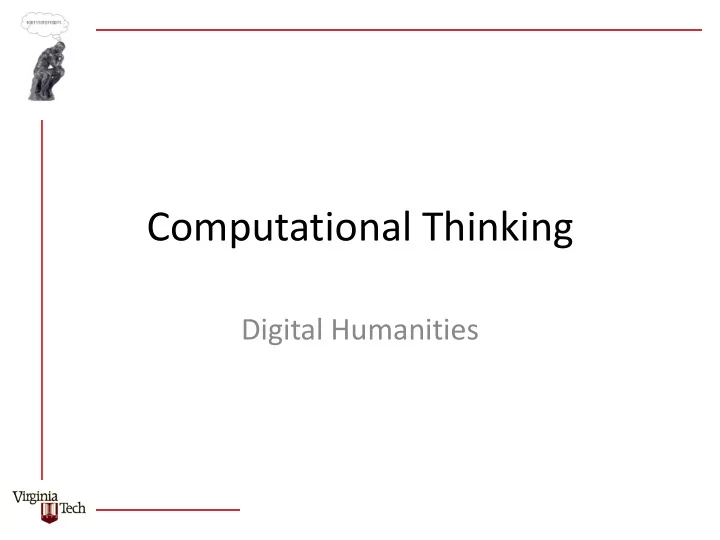

Computational Thinking Digital Humanities
Paper presents and intertwined discussion of two themes • The evolution of the digital humanities and what this can become • The organizing principle of universities Discusses the evolving meaning of the digital humanities in light of the changing nature of the university and the technology Computational Thinking 2
Importance of digital to the humanities “…there remain few outputs for the non-digital scholar to undertake research in the modern university. “ [p1] “That is, computational technology has become the very condition of possibility required in order to think about many of the questions raised in the humanities today.” [p2] Fuller: “in a sense, all intellectual work is now ‘software study’, in that software provides its media and its context… [yet] there are very few places where the specific nature, the materiality, of software is studied except as a matter of engineering” [p4] “there is an undeniable cultural dimension to computation and the medial affordances of software. This connection again points to the importance of engaging with and understanding code.” [p5] “This means that we can ask the question: what is culture after it has been ‘softwarized’?” [p5] “At all levels of society, people will increasingly have to turn data and information into usable computational forms in order to understand it at all.” [p15] Computational Thinking 3
Waves of Digital Humanites First wave 1990s-early 2000s • “tended to focus on large-scale digitization projects and the establishment • of technological infrastructure” [p3] Second wave Digital Humanities 2.0 (current) • “is deeply generative, creating the environments and tools for producing, • curating, and interacting with knowledge that is ‘born digital’ and lives in various digital contexts.” [p3] Third wave “concentrated around the underlying computationality of the forms held • within a computational medium. That is, I propose to look at the digital component of the digital humanities in the light of its medium specificity, as a way of thinking about how medial changes produce epistemic changes.” [p4] Problematizing the artifacts and processes of the digital culture • Computational Thinking 4
Meaning of digital humanities “The digital humanities try to take account of the plasticity of digital forms and the way in which they point toward a new way of working with representation and mediation…” [p1] “we need a corresponding focus on the computer code that is entangled with all aspects of our lives, including reflexivity about how much code is infiltrating the academy itself.” [p4] “…what new modes of collective knowledge software can enable or constitute. Can software and code take us beyond the individualising trends of blogs, comments, twitter feeds, and so forth, and make possible something truly collaborative -- something like the super-critical thinking that is generative of ideas, modes of thought, theories and new practices? [p8] “These are possible rich areas for research for a third-wave digital humanities that seeks to understand these potentially new forms of literature and the medium that supports them.” [p9] “…a humanistic understanding of technology could be developed, which also involves an urgent inquiry into what is human about the computational humanities or social sciences.” [p9] “…the question of code becomes central to understanding in the digital humanities, and serves as a condition of possibility for the many computational forms that mediate out experience of contemporary culture and society.” [p17] Computational Thinking 5
Nascent CT ideas “The key point is that without the possibility of discrete encoding there is no object for the computational device to process. However, in cutting up the world in this manner, information about the world necessarily has to be discarded in order to store a representation within the computer.” [p2] “…a representation of reality…can then be manipulated using algorithms.” [p2] Computational Thinking 6
Organization of the university Early view • Immanuel Kant, 1898 in The Conflict of the Faculties • University activities are organized by the concept of reason • Philosophy was the key • “Kant argued that reason and the state, knowledge and power, could be unified in the university by the production of individuals who would capable of rational thought and republican politics – students trained for the civil service and society.” [p6] Computational Thinking 7
Organization of the university Modern view • 19 th century German Idealists o Organizing principle was culture o “culture was the sum of all knowledge that is studied, as well as the cultivation and development of one’s character as a result of that study.” [p6] o Bildung – knowledge acquisition as a process rather than a product (a static knowledge base) • English view o Organizing principles was literature Computational Thinking 8
Organization of the university Post-modern view Organizing principle is digital and information • “…we are beginning to see instead the cultural importance of the digital as • the unifying idea of the university.” [p7] “This is to argue for critical understanding of the literature of the digital, • and through that develop a shared digital culture through a form of digital Bildung.” [p7] “Perhaps we are beginning to see reading and writing computer code as • part of the pedagogy required to create a new subject produced by the university, a computational or data-centric subject.” [p9] “Bildung is still a key idea in the digital university.” A university graduate • “can unify the information that society is now producing at increasing rates, and which understands new methods and practices of critical reading (code, data visualisation, patterns, narrative) and is open to new methods of pedagogy to facilitate it.” [p15] “Computational approaches facilitate disciplinary hybridity that leads to a • post-disciplinary university” [p13] Computational Thinking 9
References Berry, D.M., The Computational Turn: Thinking About the Digital Humanities. Culture Machine, 2011. 12 Computational Thinking 10
Recommend
More recommend